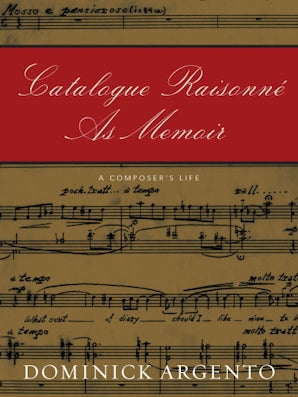
Powell's Books Wholesale
Clearance: Catalogue Raisonne As Memoir A Composer’s Life
Author: Dominick Argento
Publisher: Univ Of Minnesota Press
Clearance: Catalogue Raisonne As Memoir A Composer’s Life
Juilliard Store
144 West 66th Street
New York NY 10023
United States
Choose options
Clearance: Catalogue Raisonne As Memoir A Composer’s Life
Juilliard Store
144 West 66th Street
New York NY 10023
United States
Clearance: Catalogue Raisonne As Memoir A Composer’s Life
Juilliard Store
144 West 66th Street
New York NY 10023
United States
An arresting and emotional tour of the life and work of the 2004 Grammy-winning composer
The celebrated American composer Dominick Argento is known for the care with which he selects the subjects for his works, be they intended for opera house, concert auditorium, recital hall, or church, and for the personal involvement and interest that consistently shine through his music from the premiere in 1951 of Songs about Spring to Orpheus in 2000.
Each chapter of this luminous and revealing memoir is based on a particular composition, surrounded by Argento's reflections on the period in his life when the piece was written and its opening performance. Songs about Spring, a work of his undergraduate years, stirs memories of his instructor Nicholas Nabokov (friend of Stravinsky and cousin to Vladimir), with whom he learned to drink martinis, and also of his first collaboration with Carolyn Bailey, the soprano who would later become his wife. In the chapter on Casa Guidi, the 2004 Grammy-winning piece based on letters from Elizabeth Barrett Browning to her sister Henrietta, Argento reveals that his choice of that subject was due in part to the fact that the physical Casa Guidi, where Browning lived, was only a few blocks from his own apartment in Florence and a frequent destination for his guests. Providing insight into his actual compositional process, he also shares the private diary he kept while composing The Voyage of Edgar Allan Poe, which details his extensive research and preparation for writing that work as well as its difficult road to production and performance.
In a lifetime of compositions that have engaged Western culture from Chekhov to Miss Manners, from Don Juan to the Bremen Town musicians, Dominick Argento has encouraged audiences to focus on the hopes and fears that have defined human existence and their own lives. Now he invites us to share his own, illuminating the nature of musical composition and its hold on the human imagination.
